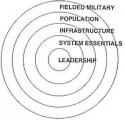Possible, but again, targeting one company is unlikely to do damage much beyond that except in very precarious circumstance. If you're dancing on the edge of a cliff any number of things can push you over the edge... but your problem in that case is not all those things that could push you over the edge, but your position on the edge of the cliff.
Certainly it's
possible that
if the US backed itself into a position where it could be so easily disrupted, and if that were sufficiently clear to outside parties, someone
might come along and exploit that for political advantage. I don't think that's what happened, but it's possible. I also don't see any realistic way of protecting ourselves from that, other than not getting into that position in the first place. Again, the conspiracy talk seems to me a distraction from the real systemic problems that need to be addressed... and all too often a way to blame some nefarious external party for problems that with political will could be brought under control.
I'm not seeing how addressing debt is going to produce a war in Central Asia. I also don't think energy will: Central Asian oil is not important enough to the US to justify war, by proxy or otherwise. China could absorb the entire output of Kazakhstan, Turkmenistan, and Azerbaijan without any significant adverse consequence for the US. It would be an issue for Russia, not because Russia needs the energy but because Russia's dominance of the export conduits for these countries gives Moscow huge influence at both ends of the pipe. I can see Central Asia as a Russia/China flashpoint more than as a China/US flashpoint.
I have asked for clarification behind the paywall...will have to wait and see.
I also see possible friction between Russia and China in the region......and I'm wondering if it would result in aligned interests between the US and Russia to check China.....to me it seems quite complex.....given the following:
The Reagan Administration effectively kaboshed Soviet/Russian efforts pipe gas into Western Europe at the time.....stunting critically needed Soviet cashflow and stunting geopolitical leverage over Western Europe if it went forward at the time.
What role would Soviet leadership THEN and Russian leadership NOW give to US involvement in the oil glut that further choked Soviet cashflow...was it a happy coincidence or planned undermining of a nation?
Fast forward to now...and the next generation of Russian leadership seem to have won the long-game in Western Europe energy politics.
How well could US/Russian leadership work together to stunt China if their interests are only roughly aligned?
Use it how? Where, and to what end? Is there any specific scenario in play here?
Call me a crackpot...but from a Machiavellian perspective....could a FAILURE TO ACT or failure to act fast enough...in a crisis environment where the US would be expected to break up a fight before it spirals out of control, but fails to do so result in an opportunity for the US to capitalize?
Example:
Pakistani based and backed terrorists/insurgents attack India(yet again) compelling India to respond with force against Pakistan.
While the crisis escalates, the US, through an act of omission rather than commission, is intentionally too slow/weak/ineffective to de-escalate the crisis in a distinct change of behavior from previous historical diplomatic efforts to de-escalate the two nuclear armed rivals.
Crisis escalates into conflict that threatens to suck China and the US into the vortex.
But with the US possessing vastly superior strategic conventional and nuclear force projection overmatch against all combined combatants and physical distance, the US decides to sit on the sidelines and quarantines the conflict area of Pakistan/India/China to let the conflict burn itself out, to potentially take a considerable amount of excess production capacity off of the table, to provide the US an opportunity/excuse to default on it's debt to China, to reduce fast growing energy demand from about a 1/3 of the planet's population and force down energy prices via a forced increase in surplus/swing energy production capacity and another generation to sort out Cheap Peak Oil, to ensure the US is sitting at the head of the table for Bretton Woods 3.0, and to provide a sufficiently large crisis to more easily push fundamental/structural reforms in the US like re-industrialization further kicking Chindia in the teeth.
Cr@ppy and dark techno-thriller pulp fiction....but I would agree with Eric Janszen that without significant and fundamental reform in the US the remaining options are quite possibly darker gambles.
If it's a choice(although I know it's not) between an easy gamble and a hard uphill climb....what would most folks choose?
Since that's my line of work, I'll agree, vigorously








 Listen close to understand how debt is used as weapon of mass financial destruction and listen to who benefits.
Listen close to understand how debt is used as weapon of mass financial destruction and listen to who benefits.



Bookmarks